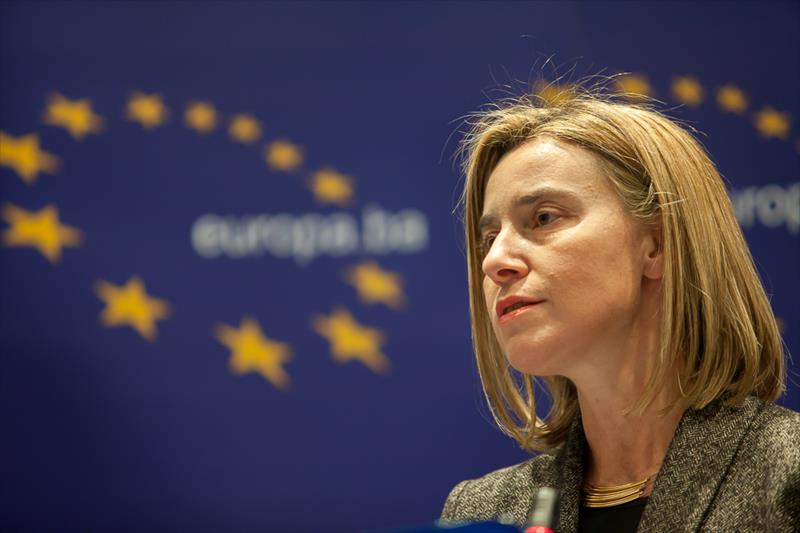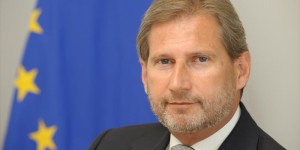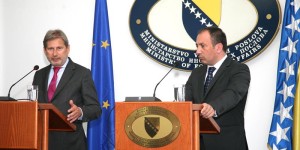23 February 2015, Sarajevo
HR/VP Mogherini: Thank you very much, thank you for being here. It is a pleasure for me to be here in Sarajevo just a couple of months after my first and last visits. I am happy today that I have had a chance to meet Members of the Presidency, that I would like to thank for their role and the leadership in these months to reach the written commitment. I had a meeting with the Presidents of both entities, with the Parliament leadership, I have had a chance of addressing the Parliament in a day that I defined as historical; it is really important to me and – I hope – to the whole country. I had a meeting with the Chairman-designate of the Council of Ministers, with the Prime Minister of Republika Srpska and the nominee for the Prime Minister of the Federation, and finally – but not least – I’ve just had an exchange of views with journalists, media and cultural activists in Ars Aevi and then I’m heading to the HQ of EUFOR Althea.
Let me start by saying that the developments we have seen in this couple of months and finishing with the endorsement today by the Parliament are very positive developments, a reaction to the EU initiative that we launched here in December. And let me be clear on the fact that this is obviously on one side a historical moment, an achievement in itself but also a starting point because we all know that the key issue will be the implementation of reforms. We all know this is the most difficult part of the job. Let me say that the EU is ready to support Bosnia and Herzegovina and its leadership and its people in the way forward.
I will now report back to the Foreign Ministers in our next Foreign Affairs Council in March. Reporting about the positive developments and recommending that the European Union reciprocates, including on the Stabilisation and Association Agreement. I think everybody is very much aware of the fact that, on one side, yes – today can be a historical moment, on the other side the risk of going back to disillusion is high and that no one here or in Brussels can afford going back to political stalemate that has been there for so long.
What people here in Bosnia and Herzegovina ask for is a European future for their country and I think that is very clear that it is time to deliver on this. We expect that work will start now immediately, at all levels, on an initial reform agenda. This would mean moving ahead with economic and social measures in the framework of the Compact for Growth and Jobs. It will mean putting in place measures for building a functional market economy. It will mean undertaking measures to strengthen the rule of law, and to strengthen the reconciliation process, and to strengthen the administrative capacities, and enhancing the efficiency of institutions at all levels.
I will close with the overall feeling that the strong political will is there. I found this in all my interlocutors today, in all institutions, in all individuals. And let me assure you that the same strong political will is there in Brussels, in the European institutions, among the Member States and I count on this political will to be able to deliver some good, positive steps for the people of Bosnia and Herzegovina. Thank you very much.
Amil Ducic, Dnevni Avaz: When can we expect the activation of the SAA? March or…?
HR/VP Mogherini: I will report to the Foreign Affairs Ministers in March at the Foreign Affairs Council. As I said, I will recommend that we take a decision in that sense. Obviously, I cannot anticipate a decision that is in the hands of the Council, but my recommendation will be clear in that direction and it will be made in March.
Almir Terzic, Agency Anadolija: Could you please HR tell me more regarding the possible problems that BiH can have from 1st of January 2016, if it does not harmonize its regulations on trade? Will that actually be one of the problems that BiH may face and what BiH authorities need to do along the way to avoid return of these tariff barriers and other things. Also, another question that is not related to BiH but is related to the accusations of Syria in relation to Turkey and entering its territory last weekend. Can you comment on that?
HR/VP: No, we won’t comment on issues that are not strictly related to why am I here today because I think that when I say it is an historical day – it can be an historical day for the country – I would like not to shadow this positive news. And I said today to many of my interlocutors the other historical thing, and this is really historical, is that in order to get the good news in the region in these days, you get to Sarajevo. So I will not spoil my day today with other comments and in the same spirit let me say that I will not speculate today about what kind of problem the country or the European Union could face in one year’s time – ‘if’. Because, now our attention is all concentrated on making this process work and one of the basic rules is that you do not start working on Plan B or Plan C or Plan D if you’re really investing on Plan A and today I think the news, the headline is that today is a historical, positive day for Bosnia and Herzegovina and for the European Union.
Because this is something we have started together with a strong political will on both sides, making very clear that only with a clear political will on both sides it will be possible for each of the sides, be it Sarajevo, be it Brussels, to build the necessary consensus to move forward and I go back to Brussels today – actually, I’m not going to Brussels today, but tomorrow – ready to say we can move forward. This was not to be given for granted in December, at all, and I think this is really thanks to the Bosnia and Herzegovina people and leadership and institutions if we can today celebrate a positive step.
Again, it’s not the end of the road, it’s not the solution to everything, but it’s the key step that can make us open, reopen the way for the country towards the European Union. And in this sense, yes, it is, I think, key, it is historical, it is a big achievement and it gives us also a strong responsibility, big responsibility on the way forward, because if you start with this positive step then, you are even more motivated, and you’re even more responsible for making as positive steps following to be consistent with this first one.
Kenan Cosic, TV1: How painful reforms expect BiH in the continuation of the European road since both politicians in the country and European integration analysts claim that this will indeed be painful process for Bosnia and Herzegovina when it comes to all conditions that we have to fulfil?
HR/VP Mogherini: Thank you very much for the question because this helps me clarifying that there is no ‘to do’ list, that is defined or written in Brussels and has to be applied here in Bosnia and Herzegovina. The key element of the relationship between Bosnia and Herzegovina, or any other country, and the European Union, is not that of pupil and teacher. We do not give homework, we do not give marks. The reforms that country will decide to undertake will be determined only by the political will and political decisions of the institutions, with indications of the needs of the people in Bosnia and Herzegovina and if reforms, if, when and what kind of reforms will be taken, will depend only on the needs and interests of the people of the country.
If reforms have to be done it is not because Brussels asks, but because the people of the country ask for them. So, full ownership, no paternalizing approach at all. I don’t know how it was done in the past, but this is for sure for now. And again, this is something very serious, because we have seen not only this temptation for this path with countries that are in the EU perspective but also countries inside the European Union, whenever there is a tough reform to pass, tough or even not too tough, to justify this because “Brussels is asking”. And this is a sort of blame game that leads to a certain unpopularity of the European Union.
Let me say very clearly, this is true for countries in the European Union, this is true for the countries that are not in the European Union today, whatever reform has to be taken it is not because someone else asks for it or defines it, but it is only to make it more sustainable for the people of the country itself, especially for the younger generations to have a future in this country. I said today in the Parliament, the reason for reforms is not Brussels, the reason for reforms is the 60 per cent of young people unemployed in the country. And it is up to the leadership of this country, it is up to the institutions of this country to define which are the reforms that are needed for these 60 percent of young people that are unemployed today.




